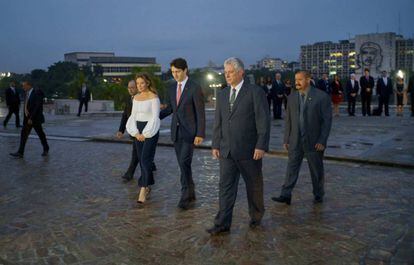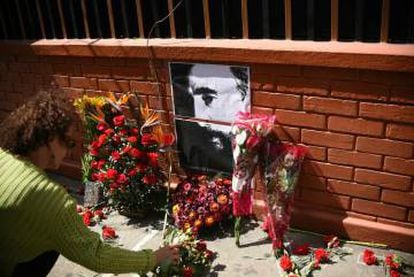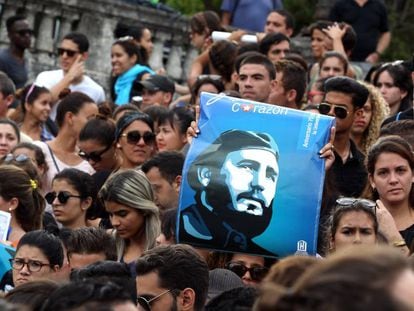What now? The difficult problem of succession in Cuba
There is no clear candidate to take over from the Castros, apart from Vice-President Díaz Canel
Fidel Castro was 90 years old when he died. Raúl Castro is 85, and the historic figures who were behind the Revolution are now few and far between. Just a handful remain, such as the commander Ramiro Valdés, or the deputy secretary of the Cuban Communist Party (PCC), José Ramón Machado Ventura, in the leadership of the government and the party itself. Others are much older or ill, and there is no clear successor to follow the Castro brothers, with the exception of the first vice-president, Miguel Díaz Canel, who is 56 and a former education minister and ex-secretary of the PCC in the provinces of Villa Clara and Holguín.

At the 6th PCC Congress, in April 2011, Raúl Castro admitted that there were no “reserves of mature substitutes with the sufficient experience to take over the main positions in the country.” Raúl promoted term limits of two five-year periods for public positions, and announced that he will leave the government in 2018 to make way for a new generation of leaders.
The reality is that, historically, the young leaders or representatives of an intermediate generation that at various times reached power were either sacked or left in disgrace after losing the confidence of the old guard. In March 2009, a year after formally assuming the presidency, Raúl Castro carried out a drastic Cabinet reshuffle, which affected 12 departments and saw the exit of eight ministers and a number of high-ranking officials.
After Raúl it will be the army who will play the decisive role and will have to support any government
At the head of those who went were two heavyweights who had been considered the natural heirs of the revolution, given how close they were to Fidel Castro for many years: former Vice-President Carlos Lage (Havana, 1951), who was responsible for the economic reforms of the 1990s, and the former minister for foreign relations, Felipe Pérez Roque (Havana 1965), who for many years worked as the Cuban leader’s private secretary. From retirement, Castro justified those sackings in cryptic terms: “The honey of power, for which they made no sacrifices, awoke in them ambitions that led them to an undignified role. The external enemy was filled with hope about them,” he wrote in the Cuban daily Granma.
The arrival of Raúl Castro to power saw a slight change in the political outlook and the profile of the succession. From 2008, Raúl has changed practically 80% of the Cabinet and government leadership, placing previously unknown figures at the helm of many key bodies, as well as top officials from the Revolutionary Armed Forces (FAR), whose business corporations control or participate in 60% of the economy. At the head of the network of military interests known as GAESA is Luis Alberto Rodríguez López-Calleja, the son of General Guillermo Rodríguez del Pozo, who has been married to a daughter of Raúl Castro for many years and is considered to be a genuine business tsar, given that the main businesses of the country are supervised from his office.
Many generals and top military brass occupy relevant positions, not just in the armed forces but also in the Communist Party and the Council of State. One of these is General Álvaro López Miera, the son of exiled Spaniards and a highly respected member of the army and the government. López Miera is one of Raúl Castro’s most trusted men and the first vice-minister of the FAR as well as chief of staff.

Other leaders with discreet profiles who have emerged over recent years within Castro’s team include Miguel Díaz Canel, whom Raúl named vice-president in 2013. Marino Murillo has also played a relevant role as minister for economy and planning until July of this year, and now as vice-president of the Council of Ministers, becoming one of the youngest members of the politburo. He has been heading the process of reform and controlled opening up of the island under Raúl Castro.
Fidel Castro had spent many years separated from power in Cuba, and as such his disappearance will not be a destabilizing factor, nor will it affect the succession, according to the majority of analysts. The same sources believe that as long as Raúl and the last remaining historic figures from the Revolution are in a position to govern, they will control any change and define the speed with which it happens. In this political and economic game of chess, the process of normalizing relations with the US is a factor of great relevance, although the Trump factor could now change the rules of the game.
Some believe that the death of Fidel could accelerate the process of reform, others don’t. What seems certain is that after Raúl it will be the army – the institution with the most power, and not just military but also economic and political – who will play the decisive role and will have to support any government. According to the former US intelligence analyst Brian Latell, who wrote the book After Fidel, “no one will be able to impose on the new regime policies that this disciplined and unified military leadership opposes.”
English version by Simon Hunter.












































